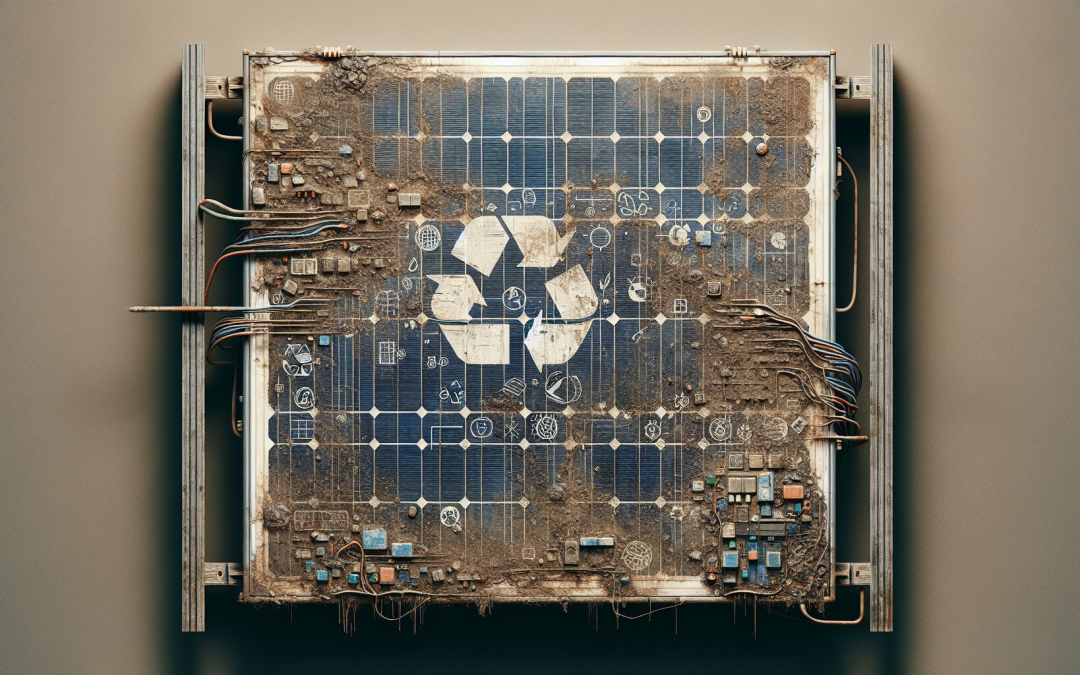So you’ve finally decided to switch to solar energy and get yourself some shiny new solar panels. But now you’re left wondering what to do with your old ones. Can you just toss them in the trash? Or is there a way to recycle them? The good news is, yes, you can recycle your old solar panels. In fact, it’s not only possible but also environmentally responsible to do so. In this article, we’ll explore the importance of recycling solar panels and how you can go about doing it. So, let’s shed some light on this eco-friendly process and find out what happens to those old solar panels once they reach the end of their lifespan.
Why Recycle Solar Panels?
When it comes to taking care of our environment, recycling is an important aspect that shouldn’t be overlooked. This holds true for solar panels as well. It’s crucial to understand the benefits of recycling solar panels and the potential consequences of not doing so. By recycling solar panels, you can contribute to a cleaner and more sustainable future.
Benefits of Recycling Solar Panels
Recycling solar panels offers a wide range of benefits, both environmental and economic. Firstly, it helps to reduce the environmental impact of electronic waste. Solar panels contain valuable and rare materials, such as silicon, silver, and aluminum. By recycling these materials, we can conserve natural resources and reduce the need for raw material extraction.
Secondly, recycling solar panels can minimize the release of harmful substances into the environment. Many solar panels contain hazardous chemicals like cadmium, lead, and selenium. If not properly handled, these chemicals can leach into soil and water, posing a threat to ecosystems and human health. Recycling ensures that these hazardous materials are safely extracted and disposed of, mitigating environmental risks.
Lastly, recycling solar panels can stimulate the economy and create job opportunities. The recycling industry employs workers to collect, transport, and process solar panels, contributing to local and global economic growth. By supporting recycling initiatives, you are indirectly supporting a sustainable economy.
The Environmental Impact of Not Recycling Solar Panels
If solar panels are not properly recycled and end up in landfills, they can have significant environmental consequences. Solar panels can take up to 400 years to decompose, and during this time, they can release toxic substances into the environment. This can contaminate soil, water sources, and wildlife habitats.
Additionally, the production of new solar panels requires a considerable amount of energy and resources. By not recycling old panels, we miss the opportunity to recover valuable materials and reduce the environmental footprint associated with manufacturing new panels. Therefore, not recycling solar panels leads to increased resource depletion and greenhouse gas emissions.
Recycling Solar Panels: The Basics
Before diving into the recycling process, it’s important to understand the components of a solar panel. Solar panels are composed of various materials, including glass, metal frames, plastic, and silicon cells. Each of these materials has its own recycling requirements and methods.
When it comes to different types of solar panels, there are primarily two categories: crystalline silicon panels and thin-film panels. Crystalline silicon panels are the most common type, consisting of silicon cells arranged in a grid-like pattern. Thin-film panels, on the other hand, are made by depositing a thin layer of a semiconductor material onto a substrate.
The Solar Panel Recycling Process
The process of recycling solar panels involves several steps to ensure the efficient recovery of valuable materials. Let’s take a closer look at each of these steps:
Step 1: Collection and Transportation
The first step in the recycling process is the collection and transportation of the solar panels. This can be done through various channels, such as manufacturers, installers, and designated collection points. Proper packaging and labeling are essential to ensure safe transportation and prevent any damage to the panels.
Step 2: Preparing for Recycling
Once the panels reach the recycling facility, they undergo a process of inspection and sorting. Any damaged or non-functioning panels are identified and separated. Moreover, the different components of the panels, such as glass, frames, and cells, are sorted out for further processing.
Step 3: Shredding and Separation
In this step, the separated solar panel components are shredded into smaller pieces. The shredded material is then processed through various techniques, such as mechanical or thermal separation, to extract valuable materials. This allows for the recovery of metals, glass, and other recyclable components.
Step 4: Recovery of Raw Materials
The final step involves the recovery of raw materials from the separated components. Valuable metals like silver and aluminum can be extracted and reused in the production of new panels. Additionally, the glass from the panels can be used in the manufacturing of other glass products. By recovering these materials, we minimize waste and reduce the demand for new resources.
Recycling vs. Landfilling Solar Panels
When it comes to the end-of-life management of solar panels, recycling is a far better option than landfilling. Landfilling solar panels can have severe consequences for the environment and human health.
The Dangers of Landfilling Solar Panels
When solar panels end up in landfills, the hazardous materials they contain can slowly seep into the ground and contaminate soil and water sources. This can have far-reaching impacts on ecosystems, affecting plants, animals, and even human populations that rely on these resources. Moreover, the space occupied by solar panels in landfills could be better utilized for non-hazardous waste or other forms of waste management.
Economic and Environmental Benefits of Recycling
On the other hand, recycling solar panels offers several benefits. Recycling not only reduces the release of hazardous chemicals but also conserves valuable resources. By recovering and reusing materials from old panels, we can reduce the energy and resource consumption associated with the production of new panels. Furthermore, recycling creates jobs and stimulates the economy, contributing to sustainable development.
The Global Landscape of Solar Panel Recycling
Solar panel recycling is gaining momentum globally, driven by the recognition of its environmental and economic benefits. Various recycling initiatives and regulations have been established to promote the responsible end-of-life management of solar panels.
Recycling Initiatives and Regulations
Many countries and regions have implemented recycling initiatives, such as extended producer responsibility (EPR) programs. These programs hold manufacturers accountable for the proper disposal and recycling of their products, including solar panels. Additionally, several countries have developed specific regulations and guidelines for the recycling of solar panels to ensure compliance and environmental protection.
Challenges and Solutions on a Global Scale
While the awareness and efforts around solar panel recycling have grown, some challenges still need to be addressed. One challenge is the lack of uniform regulations and standards across different countries, which can create barriers to international recycling practices. Additionally, the high costs associated with the recycling process can be a hindrance to widespread adoption. However, ongoing research and collaborations are focused on finding cost-effective and efficient solutions to overcome these challenges.
Options for Recycling Old Solar Panels
If you have old or end-of-life solar panels that need recycling, there are several options available to you.
Contacting Manufacturers and Installers
One option is to reach out to the manufacturers or installers of your solar panels. Many manufacturers have takeback programs in place, where they are responsible for the proper disposal and recycling of their products. They can provide guidance on how to return the panels or direct you to their authorized recycling partners.
Local Recycling Facilities
Local recycling facilities may also accept solar panels for recycling. It is advisable to contact these facilities beforehand to inquire about their specific requirements and procedures. They can provide instructions on how to safely transport the panels and any necessary documentation needed for proper recycling.
Third-Party Recycling Programs
There are also third-party recycling programs dedicated to handling solar panel recycling. These programs often collaborate with recycling facilities and manufacturers to ensure proper and efficient recycling. Researching and reaching out to these programs can provide you with a clear understanding of their recycling processes and how to participate.
Considerations for Disposing of Solar Panels
When disposing of solar panels, it’s important to take proper handling and safety precautions. Solar panels can be fragile and contain hazardous materials, so it’s essential to follow certain guidelines:
Proper Handling and Safety Precautions
Handle solar panels with care to prevent any breakage or damage during transportation and disposal. Wear protective gloves and follow safety guidelines when handling panels that contain hazardous substances. Moreover, make sure to follow local regulations for the safe transportation and disposal of solar panels.
Legal Requirements and Regulations
Familiarize yourself with the legal requirements and regulations regarding the disposal of solar panels in your area. Some jurisdictions have specific rules for the transportation and disposal of electronic waste, including solar panels. Compliance with these regulations helps to ensure proper waste management and protects the environment.
Incentives and Programs for Solar Panel Recycling
To encourage solar panel recycling, there are various incentives and programs available at different levels.
Rebates and Incentives
Some governments and organizations offer rebates or financial incentives for recycling solar panels. These incentives can help offset the costs of recycling and provide an added motivation for individuals and businesses to responsibly recycle their panels. Researching local programs and incentives can help you take advantage of these opportunities.
Government Programs
Many governments have implemented programs to promote the recycling of solar panels. These programs may include financial assistance, education and outreach initiatives, and partnerships with recycling facilities. Keeping track of government programs can provide you with valuable resources and support for recycling your solar panels.
Manufacturer Takeback Programs
As mentioned earlier, many solar panel manufacturers have takeback programs in place. These programs demonstrate the manufacturer’s commitment to responsible waste management and help facilitate the recycling process for consumers. Participating in these takeback programs ensures that your old panels are handled and recycled by the manufacturer or their authorized recycling partners.
Innovations in Solar Panel Recycling
The field of solar panel recycling is constantly evolving, with advancements in technologies and sustainable solutions.
Advancements in Recycling Technologies
Researchers and scientists are continuously working on improving recycling technologies and processes for solar panels. These advancements aim to enhance the efficiency and effectiveness of the recycling process, making it more economically viable and environmentally friendly. For example, new techniques are being developed to extract higher percentages of raw materials from solar panels, reducing waste and maximizing resource recovery.
Research and Development in Sustainable Solutions
Beyond recycling, research and development efforts are focused on finding sustainable solutions for the entire lifecycle of solar panels. This includes designing panels with reusable or easily recyclable components, as well as exploring alternative materials that are more environmentally friendly. These innovations aim to minimize the environmental impact of solar panels throughout their lifespan and promote a circular economy.
Conclusion
Recycling solar panels is not only an environmental responsibility but also a means to create a more sustainable future. By understanding the benefits of recycling and the potential consequences of not doing so, you can make informed choices about the end-of-life management of your solar panels. Whether through contacting manufacturers, utilizing local recycling facilities, or participating in third-party recycling programs, there are multiple options available to responsibly dispose of your old panels. By contributing to solar panel recycling efforts, you can play a crucial role in conserving resources, reducing waste, and protecting the environment for generations to come.









